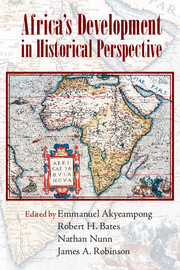Book contents
- Frontmatter
- Contents
- Author Biographies
- Acknowledgments
- Introduction
- Part I La Longue Durée
- Part II Culture, Entrepreneurship, and Development
- Part III Institutions
- 12 The Fragile Revolution: Rethinking War and Development in Africa’s Violent Nineteenth Century
- 13 The Imperial Peace
- Part IV External Forces
- Index
- References
13 - The Imperial Peace
Published online by Cambridge University Press: 05 September 2014
- Frontmatter
- Contents
- Author Biographies
- Acknowledgments
- Introduction
- Part I La Longue Durée
- Part II Culture, Entrepreneurship, and Development
- Part III Institutions
- 12 The Fragile Revolution: Rethinking War and Development in Africa’s Violent Nineteenth Century
- 13 The Imperial Peace
- Part IV External Forces
- Index
- References
Summary
When praised at all, imperialism is most often commended for the peace it bestowed. By demobilizing armies, deposing marauding princes, and subduing war-like states, European powers fashioned a half century of political order. The question nonetheless arises: Should they be lauded for doing so? In this chapter, I view Africa’s history through the lens of comparative history and argue that the imperial peace may have retarded Africa’s development.
Those addressing the rise of the West often highlight the contribution of the state. The Western state has inflicted untold misery, they acknowledge; but they also stress its importance for development. An important school of thought argues that the two faces of power – the one destructive and the other developmental – share common origin: the Western state became developmental the better to finance its wars (Brewer 1988; Gilbert 1975; Roberts 1956; Tilly 1985). Driven by insecurity abroad, states become developmental at home, these scholars argue: heads of state employ power to foster economic growth and thereby finance their militaries. If the threat of war thus rendered European states developmental, then the possibility arises that imperial peace may have contributed to the underdevelopment of Africa (but see Centeno 1997). Viewed against this background, the imperial peace assumes a new guise: rather than conferring a blessing, it may have imposed a cost; it may have stilled the impulse to development that originates from the search for security in a hostile political environment.
- Type
- Chapter
- Information
- Africa's Development in Historical Perspective , pp. 424 - 444Publisher: Cambridge University PressPrint publication year: 2014
References
- 10
- Cited by



